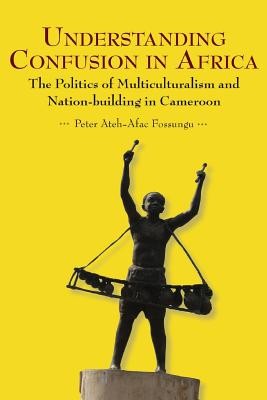
- We will send in 10–14 business days.
- Author: Peter Ateh-Afac Fossungu
- Publisher: Langaa RPCID
- Year: 2013
- Pages: 270
- ISBN-10: 9956728535
- ISBN-13: 9789956728534
- Format: 15.2 x 22.9 x 1.6 cm, minkšti viršeliai
- Language: English
- SAVE -10% with code: EXTRA
Understanding Confusion in Africa. The Politics of Multiculturalism and Nation-building in Cameroon (e-book) (used book) | bookbook.eu
Reviews
Description
Cameroon is often considered to be Africa's legendary pathfinder. This book argues essentially that Cameroon cannot competently champion African unity and progress until it can correctly pursue its own multicultural nation-building. Cameroon's success continental-wise would depend on its theory and practice of multiculturalism, as particularly reflected in (1) the rejoicing in its historical diversity and the harmonious co-existence of its Systems of Education which must, of necessity, be linked to (2) effective federalization or decentralization of uniquely cultural matters. Critically examining history and education as components of culture, and therefore, of multiculturalism, the book makes some bold recommendations while demonstrating how nation-building is meaningless without the people's authentic history. It argues that Cameroon national culture cannot be a national culture without embodying the distinct culture of the English-speaking minority. Anything else is nothing but deliberate confusion of assimilation for multiculturalism, a confusion that is heavily tied to the country's phoney independence. Hinging on education (and its associates of bilingualism and bijuralism), the book demonstrates that Cameroon's over-sung cultural dualism is a charade, epitomized by the 1998 Education Law. Rather than reaffirm Cameroon's biculturalism as it superficially avows, Cameroon's purported cultural dualism is really out to efface any semblance of cultural or educational dualism that may still be resisting assimilation. The continuous and persistent employment of terms such as biculturalism, bilingualism and bijuralism in legal texts in Cameroon is only to confuse the international community, especially from seeing exactly the kind of 'ethnic cleansing' which is taking place in the country.
EXTRA 10 % discount with code: EXTRA
The promotion ends in 22d.02:54:27
The discount code is valid when purchasing from 10 €. Discounts do not stack.
- Author: Peter Ateh-Afac Fossungu
- Publisher: Langaa RPCID
- Year: 2013
- Pages: 270
- ISBN-10: 9956728535
- ISBN-13: 9789956728534
- Format: 15.2 x 22.9 x 1.6 cm, minkšti viršeliai
- Language: English English
Cameroon is often considered to be Africa's legendary pathfinder. This book argues essentially that Cameroon cannot competently champion African unity and progress until it can correctly pursue its own multicultural nation-building. Cameroon's success continental-wise would depend on its theory and practice of multiculturalism, as particularly reflected in (1) the rejoicing in its historical diversity and the harmonious co-existence of its Systems of Education which must, of necessity, be linked to (2) effective federalization or decentralization of uniquely cultural matters. Critically examining history and education as components of culture, and therefore, of multiculturalism, the book makes some bold recommendations while demonstrating how nation-building is meaningless without the people's authentic history. It argues that Cameroon national culture cannot be a national culture without embodying the distinct culture of the English-speaking minority. Anything else is nothing but deliberate confusion of assimilation for multiculturalism, a confusion that is heavily tied to the country's phoney independence. Hinging on education (and its associates of bilingualism and bijuralism), the book demonstrates that Cameroon's over-sung cultural dualism is a charade, epitomized by the 1998 Education Law. Rather than reaffirm Cameroon's biculturalism as it superficially avows, Cameroon's purported cultural dualism is really out to efface any semblance of cultural or educational dualism that may still be resisting assimilation. The continuous and persistent employment of terms such as biculturalism, bilingualism and bijuralism in legal texts in Cameroon is only to confuse the international community, especially from seeing exactly the kind of 'ethnic cleansing' which is taking place in the country.


Reviews